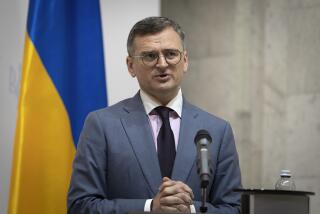WHO’LL SUCCEED SHEVARDNADZE?
- Share via
The next Soviet foreign minister will face a world different from the one Eduard A. Shevardnadze took on five years ago, but the possible candidates are all dedicated followers of the policy their predecessor set down.
Most work in the Foreign Ministry and have experience as diplomats or scholars, the kind of training Shevardnadze lacked when Mikhail S. Gorbachev appointed him in 1985 to take over for Andrei A. Gromyko.
Unlike Shevardnadze, a crusader for change, the next foreign minister will need to cultivate the Soviet Union’s new role as a self-declared mediator, rather than a supporter of revolution.
The new foreign minister likely will have less financial and military aid to use as a tool in his work, with his government facing a flagging economy. And he will need a knowledge of international economics, with his leaders expecting more materially from its foreign friends.
Here’s a look at some of those considered candidates for the job:
Yevgeny M. Primakov (pronounced Pree-mah-kof’), the first possible candidate mentioned in the Soviet press after Shevardnadze’s resignation, is a 61-year-old former professor known most recently for his shuttle diplomacy to Iraq looking for a solution in the Persian Gulf.
His effort failed after several meetings with Iraqi leader Saddam Hussein, reported to be a longtime friend. But still it heightened his status as a savvy envoy who at least tried to deal with Hussein.
Primakov has been a director of the prestigious Institute for World Economy and International Relations. An expert on the Middle and Far East, as well as having a doctorate in economics, Primakov helped devise the “new thinking” foreign policy that Shevardnadze was implementing.
Primakov recently was criticized in the Soviet press for being among officials who received new, state-owned apartments without the usual waiting period. But the news didn’t seem to tarnish his image; he also was mentioned as a possible candidate for the proposed new post of vice president.
Valentin M. Falin (Fah’-lin), 64, became chief of the Communist Party’s international department in 1988, before the party’s credibility plummeted and the job lost some influence over foreign policies.
Falin is considered a master diplomat and the leading Soviet expert on Western Europe. He rose through the Foreign Ministry’s European departments and served as a Soviet attache in Austria and ambassador to West Germany.
He was an adviser to Gromyko in 1965, a national legislator on the foreign affairs committee, a member of the government daily Izvestia’s editorial board, and a member of the party’s policy-making Central Committee.
Vladimir F. Petrovsky (Peh-trof’-skee), a deputy foreign minister since 1986, has seen his stock rise since returning from Iraq last month to seek a solution to the gulf crisis.
The 57-year-old diplomat was in Baghdad while Moscow began dropping its cautionary tone and threatening to support force against Iraq if Hussein didn’t pull out of Kuwait.
He began his foreign service career as an English translator at the United Nations, later rising under Gromyko. He later became chief of the Foreign Ministry’s U.S. department, then head of the ministry’s section that deals with international organizations.
Yuli M. Vorontsov (Voh-rahn’-tsof), 61, a rare generalist in Soviet diplomacy, worked in the United States, India and France before being sent as a trouble-shooting ambassador to Afghanistan during the Soviet pullout in 1988.
His experience includes meeting secretly in 1985 with Israel’s ambassador in France to discuss restoration of ties, defending Soviet human rights policies at a conference in 1977, and leading disarmament talks in 1985 over U.S. and Soviet nuclear weapons.
He later was brought back to Moscow and made first deputy foreign minister, solidifying his place in a new generation of flexible, innovative diplomats.
Alexander A. Bessmertnykh (Bes-mairt-nikh’), 57, an expert on U.S.-Soviet relations, was made Soviet ambassador to the United States in April in a sweeping appointment of new foreign service officers.
He had served in the Soviet Embassy in Washington for 13 years before returning to Moscow in 1983, where he was a deputy foreign minister responsible for the United Nations and North America. He later rose to become one of three first deputy foreign ministers.
More to Read
Sign up for Essential California
The most important California stories and recommendations in your inbox every morning.
You may occasionally receive promotional content from the Los Angeles Times.













